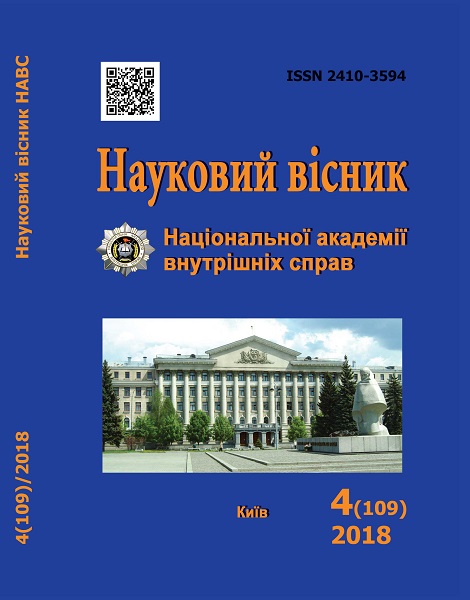Directions for the Improvement of Criminal-Legal Counteraction to the Use of the Funds Obtained from Illegal Drug Trafficking
Abstract
An important component of the strategy to counteract to the illegal circulation of narcotic drugs, psychotropic substances and precursors is the implementation of measures aimed at identifying and confiscating funds derived from this illegal activities and minimizing the possibility of their use in legal turnover of funds (business) and everyday life. Such approaches to combating organized crime and drug trafficking are considered effective at the international level, that is why the criminalization of the use of funds derived from illicit drug trafficking in Ukrainian criminal legislation should comply with the requirements of the international documents to which our state has joined. Since the introduction in 1995 of the Criminal Code of Ukraine Article 22912, and since 2001 ‒ Article 306 in new Criminal Code of Ukraine, which impose penalties for the use of funds derived from illicit drug trafficking, and until 2018, only 1,700 such offenses were detected by law enforcement agencies, at the same time none of those cases was placement of funds derived from the illicit trafficking of narcotic drugs, psychotropic substances, their analogues or precursors, in banks, in enterprises, in institutions, organizations and their subdivisions. The authors note that one of the reasons for this unsatisfactory state is the imperfection of the existing provisions of the Criminal Code of Ukraine. In addition, the existence of two norms in Ukrainian legislation (Articles 306 and 209 of the Criminal Code of Ukraine), which in essence should protect the same social values, but differ in the origin of the crime (drugs, pimping, weapons, distribution of pornography, etc.) and severity of punishment, in certain circumstances, cause an additional unnecessary burden on law enforcement and judicial authorities in the process of clarifying and proving a specific source of criminal incomes. The article reveals the problematic issues that arise in the practice of law enforcement agencies regarding the normative provision of counteracting to the use of funds derived from illicit trafficking in narcotic drugs, psychotropic substances and precursors. Legislative proposals have been formulated to the Criminal Code of Ukraine, in particular: 1) exclude article 306; 2) part 1 of Article 209 shall be supplemented with the words «or a fine of one hundred to five hundred non-taxable minimum incomes of citizens»; part 2 of Article 209, after the words «or in large scale», to be supplemented with the words «or with the proceeds derived from the illicit circulation of narcotic drugs, psychotropic substances, their analogues, precursors»; part 2 of Article 209 shall be supplemented with the words «or a fine of five hundred to one thousand non-taxable minimum incomes of citizens»; 3) part 3 of Article 307 after the words «or committed with the involvement of a minor or a minor» shall be supplemented with the words «or with the use of proceeds derived from the illicit trafficking of narcotic drugs, psychotropic substances, their analogues, precursors, in order to continue such treatment». In the opinion of the authors of the article, the simplification of the application of the legislation on criminal liability for combating the laundering of proceeds from any type of criminal activity will reduce the unnecessary burden on law enforcement and judicial authorities during the investigation and trial in the court, increase of their working capacity and the preservation of human resources. Thus, the strategic direction of the activity of law enforcement agencies of Ukraine in counteracting illicit drug trafficking is to consider the undermining of its economic basis, the creation and implementation of a comprehensive system of legal, in particular criminal, legal, organizational, operational and investigative and other measures aimed at identifying and eliminating channels of legalization of incomes, obtained by criminal means.
Downloads
Abstract views: 121 PDF Downloads: 63
- Authors reserve the right to authorship of their own work and transfer to the magazine the right of the first publication of this work under the terms of the Creative Commons Attribution License, which allows other persons to freely distribute published work with mandatory reference to authors of the original work and the first publication of an article in this magazine.
- Authors have the right to enter into separate additional agreements on non-exclusive dissemination of the work in the form in which it was published in the journal (for example, to post an article in the institution's repository or to publish as part of a monograph), provided that the link to the first publication of the work in this journal is maintained.
- The journal's policy allows and encourages the posting of articles by authors on the Internet (for example, in electronic storehouses of institutions or on personal websites), both before the submission of this manuscript to the editorial office and during its editorial processing, as this contributes to the creation of a productive scientific discussion and positively affects the efficiency and dynamics of citing the published work.




